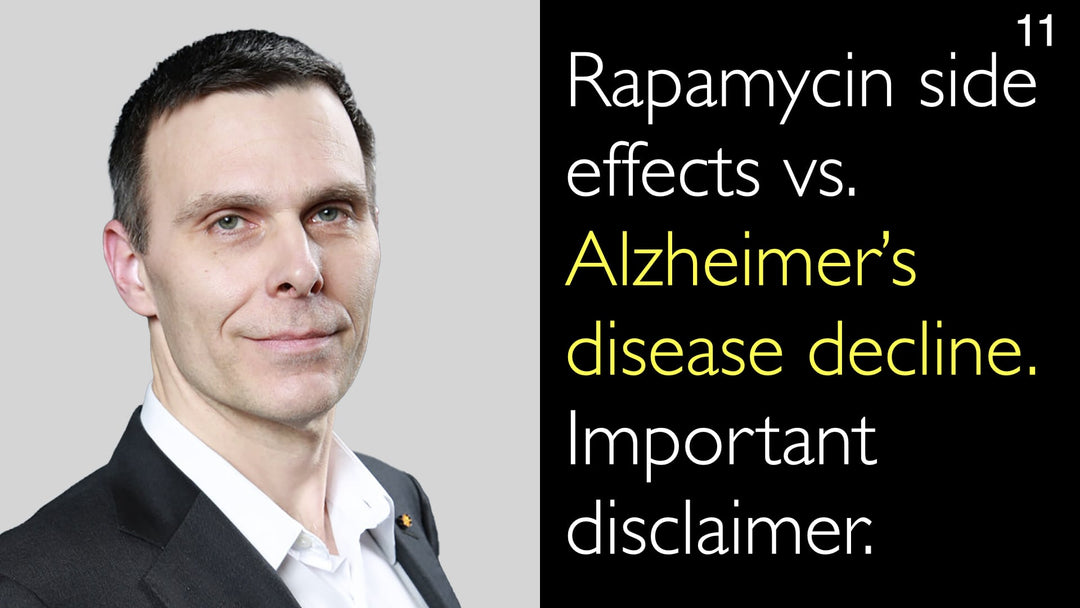노화 및 라파마이신 연구 분야의 선도적 전문가인 Matt Kaeberlein 박사(MD, PhD)가 알츠헤이머병에 대한 라파마이신의 적응증 외 사용(off-label use)을 분석한 최신 연구를 소개합니다. 그는 환자 경험과 부작용 데이터를 수집한 설문 기반 연구 프로젝트를 상세히 논의하며, 이 치료법의 실험적 성격을 강조합니다. Kaeberlein 박사는 환자들이 반드시 의사의 감독 하에서만 라파마이신을 사용할 것을 강력히 권고합니다.
알츠하이머병 치료를 위한 라파마이신: 허가 외 사용과 진행 중인 연구
섹션 바로가기
허가 외 라파마이신 연구
Matt Kaeberlein 박사(MD, PhD)가 허가 외 라파마이신 사용을 연구하는 새로운 과제에 대해 논의합니다. 이 연구는 다양한 건강 목적으로 라파마이신을 복용하는 사람들을 대상으로 설문 조사를 진행할 예정입니다. 특히 알츠하이머병 치료나 발병 위험 감소를 위해 라파마이신을 사용하는 환자들의 데이터를 집중적으로 수집합니다. Matt Kaeberlein 박사(MD, PhD)가 Anton Titov 박사(MD)에게 이 프로젝트의 목표를 설명합니다. 본 연구는 이중맹검 위약 대조 임상시험이 아닙니다.
환자 경험 데이터 수집
연구 방법론은 포괄적인 환자 설문 조사를 포함합니다. Matt Kaeberlein 박사(MD, PhD)는 인지된 효과와 부작용을 파악하는 연구 방식을 상세히 설명합니다. 환자들은 자신의 의무기록과 치과 기록을 공유하도록 요청받을 예정입니다. 이를 통해 연구진은 라파마이신 사용 전후의 정량적 비교 자료를 구축할 수 있습니다. Kaeberlein 박사는 Anton Titov 박사(MD)에게 이 접근법이 의미 있는 실제 임상 데이터를 제공할 수 있다고 말합니다.
고위험 알츠하이머병 환자군
주요 관심 대상은 치매 고위험군인 ApoE4 동형접합체 보유자입니다. Matt Kaeberlein 박사(MD, PhD)는 허가 외로 라파마이신을 처방하는 Alan Green 박사와 협력하고 있습니다. Green 박사는 이러한 고위험 유전적 프로필을 가진 많은 환자를 진료하고 있습니다. 이들은 일반 인구보다 알츠하이머병 발병 위험이 현저히 높습니다. 이들의 라파마이신 사용 경험을 연구하면 예방 효과에 대한 중요한 통찰을 얻을 수 있습니다.
라파마이신 부작용 프로파일
주요 연구 목표 중 하나는 비이식 환자에서의 부작용 발생 빈도를 정량화하는 것입니다. Matt Kaeberlein 박사(MD, PhD)는 사용 맥락의 차이를 강조합니다. 허가 외 사용자들은 일반적으로 주당 1회 4~6mg의 라파마이신을 복용합니다. 이는 장기 이식 환자들이 사용하는 요법과는 크게 다릅니다. 이식 환자들은 다른 면역억제제와 함께 매일 고용량을 복용합니다. 실제 임상에서의 부작용 프로필을 이해하는 것이 핵심 연구 목표입니다.
중요 의학적 주의사항
Matt Kaeberlein 박사(MD, PhD)와 Anton Titov 박사(MD) 모두 이 점을 강조합니다. 라파마이신은 알츠하이머병 및 노화 관련 용도로 여전히 실험적 약물입니다. 이는 의사의 감독 하에 사용해야 하는 처방약입니다. Kaeberlein 박사는 자가 투약을 강력히 경고합니다. 그는 연락하는 사람들에게 항상 주치의나 수의사와 상담할 것을 당부합니다. 본 정보는 교육 목적으로만 제공되며 의학적 조언이 아닙니다.
전체 대화록
Anton Titov 박사(MD): 박사님께서 말씀하신 길고 고된 여정을 들으면서 한 가지 질문이 더 생겼습니다. 알츠하이머병은 환자 본인뿐 아니라 돌봄 제공자와 가족에게도 막대한 부담을 줍니다.
그러므로 알츠하이머병 환자 중 라파마이신을 허가 외로 사용하는 사람들이 분명 있을 것입니다. 아마 스스로 결정하여 사용하는 경우도 있겠죠. 적어도 그러한 환자들의 데이터를 종합적으로 분석하려는 연구는 없을까요? 다른 분야에서는 그러한 시도가 이루어지고 있습니다. 양적 자기 측정 운동 등 다양한 영역에서 사람들이 그러고 있죠. 이에 대해 박사님은 어떻게 생각하십니까?
Matt Kaeberlein 박사(MD, PhD): 그 질문을 주셔서 기쁩니다. 우리는 방금 Impetus Grant Program으로부터 정확히 그 일을 하기 위한 연구비를 승인받았기 때문입니다. 앞으로 2~3주 내에 우리는 허가 외로 라파마이신을 복용하는 사람들에 대한 대규모 설문 조사를 시작할 것입니다. 이는 알츠하이머병이나 그 위험 감소뿐만 아니라 다양한 잠재적 건강 효과를 목적으로 하는 사람들을 포함합니다.
우리는 부작용과 잠재적 인지 효과에 대한 데이터를 모두 수집하려고 합니다. 또한 해당 환자들에게 의무기록과 치과 기록을 공유하도록 요청하여 라파마이신 사용 전후의 정량적 비교를 시도할 것입니다.
완벽하지는 않습니다; 이중맹검 위약 대조 임상시험은 아닙니다. 하지만 Titov 박사님께서 언급하신 대로, 실제 환자 경험을 이러한 방식으로 포착하면 정말 흥미롭고 유익한 정보를 얻을 수 있다고 생각합니다.
우리는 실제로 Alan Green 박사와 협력하고 있습니다. 그는 허가 외 라파마이신 처방의 최전선에 있는 의사 중 한 분이며 이 프로젝트에 참여하고 있습니다. 그는 실제로 ApoE4 동형접합체 보유자 환자 여러 명을 진료하고 있습니다—아직 치매나 알츠하이머병이 발병하지는 않았지만, 일반 인구보다 훨씬 높은 치매 발병 위험이 있는 고위험군입니다—이들이 라파마이신을 복용 중입니다.
상당한 수의 ApoE4 동형접합체 보유자들도 포함되어 있습니다. 특히 이 그룹의 개인들이 어떤 경험을 했는지 파악하려는 시도는 매우 흥미로울 것이라고 생각합니다.
저는 이를 잠재적 긍정적 효과(존재한다면)에 대한 감을 잡는 것—그리고 우리는 아직 모른다는 점을 분명히 해야 합니다; 그래야 진짜 임상시험을 하고 싶어지니까요—과 동시에 실제로 부작용의 발생 빈도를 정량화하려는 시도로 봅니다.
바로 이러한 점에서 이러한 환자들로부터 상당히 좋은 그림을 얻기 시작할 수 있다고 생각합니다. 그들은 장기 이식 환자들과는 매우 다릅니다; 장기 이식을 받은 적이 없으며, 다른 면역억제제를 고용량으로 복용하지도 않습니다.
대부분은 주당 1회, 4~6mg의 라파마이신을 복용합니다. 따라서 장기 이식 환자들과는 매우 다른 투여 요법입니다. 이러한 환자들에서 실제 부작용 발생 빈도가 어떠한지 파악하는 것 또한 가치 있을 것입니다.
Anton Titov 박사(MD): 시청자 여러분께 상기시켜 드리고 싶습니다. 우리가 말하는 것, 박사님이 말하는 것, 또는 이 약물에 관한 다른 누구의 말도 의학적 조언으로 해석되어서는 안 됩니다. 이는 순전히 정보 제공 및 일반 정보 목적을 위한 것입니다.
사람들은 항상 자신의 주치의와 상담해야 합니다. 이는 중요한 주의사항이며, 인터넷에서 들은 어떤 것도 의학적 조언이나 행동 촉구로 받아들여서는 안 됩니다. 사람들에게 이를 상기시키는 것이 매우 중요하다고 생각합니다.
Matt Kaeberlein 박사(MD, PhD): 저는 그 말에 동의합니다. 제가 종종 개나 자신을 위해 라파마이신을 원하는 사람들에게서 연락을 받는다는 말을 들으면 놀라지 않으실 겁니다. 저는 항상 그들에게 같은 말을 합니다: 적어도 이러한 용도로는 이게 실험적 약물이라는 점을 인지하는 것이 중요하며, 이는 처방약입니다.
법적으로, 라파마이신을 복용하려면 반려동물용이라면 수의사로부터, 자신용이라면 주치의로부터 처방전을 받아야 할 의무가 있습니다. 확실히, 주치의의 감독과 인지 하에 이를 해야 합니다.
동의합니다, 이는 의학적 조언이 아닙니다. 이를 시행하려면 의사의 관리 하에 시행하기를 원할 것입니다. 사람들이 이 점을 인지하는 것이 정말 중요하다고 생각합니다.




